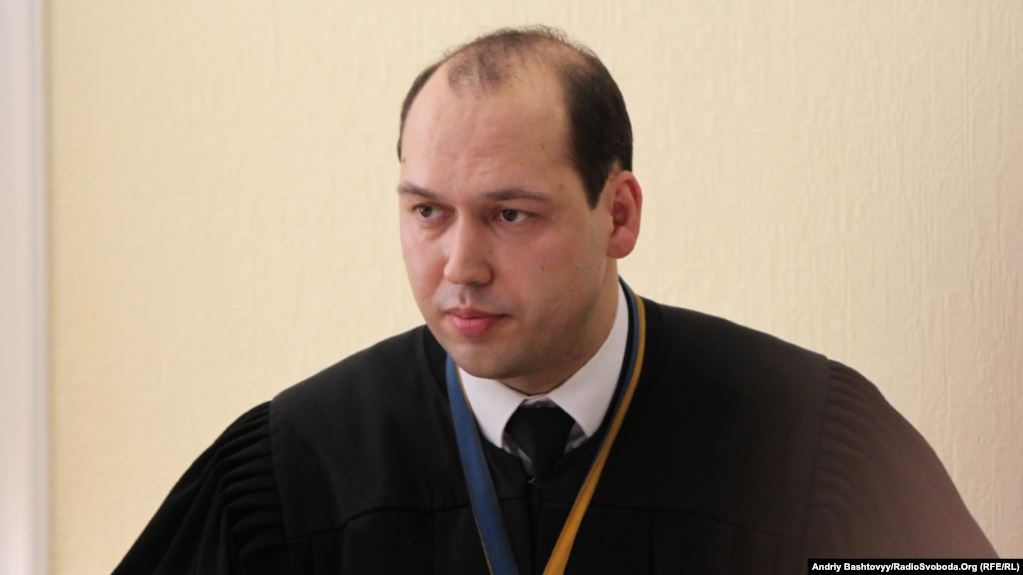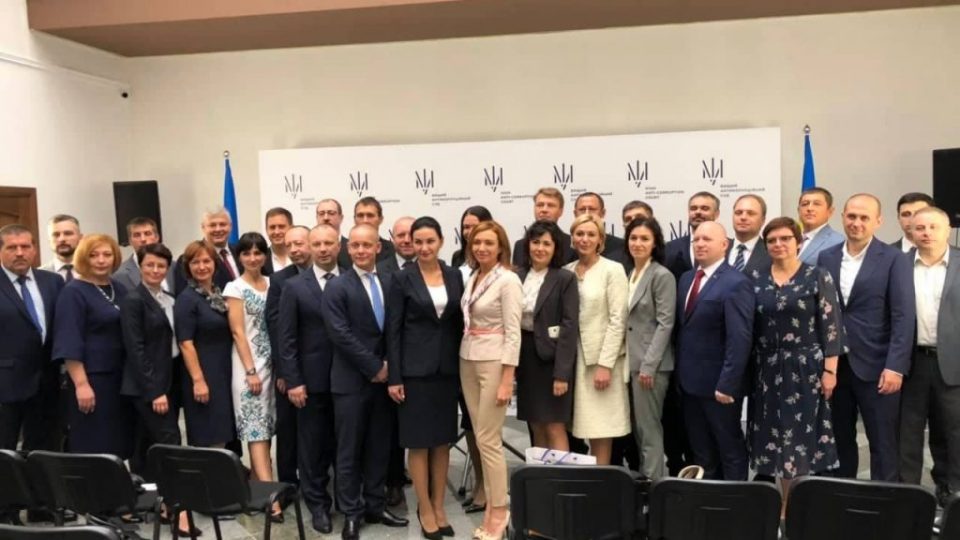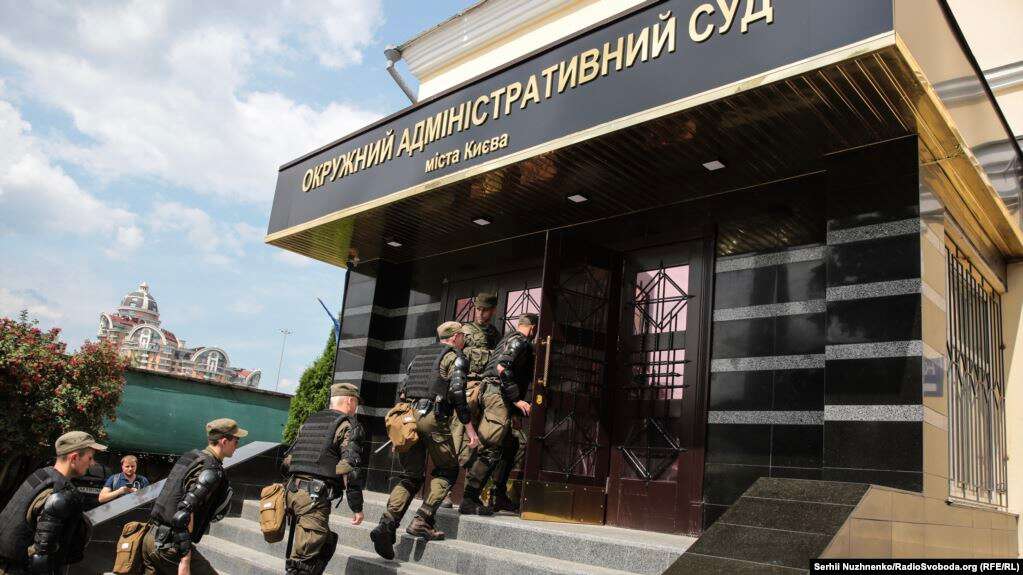This is by no means the first scandal involving this court’s participation. However, due to machinations and likely cover-ups by key state figures and institutions, the court has managed to stay afloat. After the recent scandal, various means have been put to discredit the work of the bureau and not allow the cases of the judges implicated in the scandal to be considered fairly.
The fact that such an investigation could happen at all is a result of Ukraine being able to build independent anti-corruption institutions, including the National Anti-Corruption Bureau (NABU). Opposition to their work shows the political dependency of other key institutions and their corrupt nature.
A court with a scandalous reputation
The Kyiv District Administrative Court has exclusive powers to consider cases on central state bodies located in Kyiv. Therefore, this court makes decisions regarding the key areas of life of the country.
The court is well known for its dubious decisions in the past, including legitimizing the dispersal of the Euromaidan protests, blocking investigations into high-profile corruption, stopping competition for the position of the head of customs, and blocking reform within its own area of operation.
In December 2017, then-president Petro Poroshenko took a number of decisions on dissolving courts. Liquidating the Kyiv District Administrative Court was planned and agreed upon with the High Council of Justice, a body of judicial self-governance in terms of judicial reform. However, at the eleventh hour it was excluded from the list of courts that were required to be dissolved, and thus continued operation.
On 26 July 2019, public disquiet concerning the court received additional confirmation when the NABU together with the Prosecutor General’s Office conducted searches at the court.
The law enforcers stated that they were investigating whether the court interfered in the work of the High Qualification Commission of Judges, another body of judicial self-governance, and obstructed the qualification assessment. Also, the Anti-Corruption Bureau released tapes which allegedly contain conversations involving the court’s judges, who are heard clearly interfering with the work of other state bodies.
A year later, the NABU released another tape from the scandal-ridden court.
New NABU tapes reveal the court aimed to take control of judicial bodies

Pavlo Vovk, the head of the Kyiv District Administrative Court is now declared wanted by the NABU. Photo: RFE/RL
On 17 July 2020, the NABU infomed that its detectives had served Pavlo Vovk, the head of the Kyiv District Administrative Court; his deputy Yevhen Ablov; five other judges of the court; and Zenoviy Kholodniuk, the head of the State Judicial Administration of Ukraine with a notice of suspicion. The process regarding four more people was ongoing.
The NABU states that the investigation established that the above-mentioned persons acted as a part of a criminal organization headed by Pavlo Vovk, which aimed to seize state power by means of taking control over the High Council of Justice and the High Qualification Commission of Judges, and creating artificial obstacles in their work.
The bureau presented a video with fragments of recordings and their transcripts.
“Detectives not only documented individual acts of corruption but also exposed the entire system of administered justice, which not only contributed to the personal enrichment of judges but was also used by the head of the Kyiv District Administrative Court as a tool to seize power over the judiciary,” says the NABU statement.
The bureau divided the case against the court into five parts, explaining and providing the transcript for each. Here is a short overview of it.
Part I. Assets and Lifestyle
Detectives identified that the chairman and judges of the court owned expensive assets and that their lifestyle was incompatible with the level of their official income. At the same time, only a small part of the assets was reflected in the judge’s declarations of assets.
Part II. Ordered decisions
Regarding the parliamentary coalition. In 2019, the court considered a case to recognize the absence of a coalition of parliamentary factions. The decision would have paved the way for the parliament’s further dissolution being based on a court decision. According to Ukrainian legislation, if no parliamentary coalition is formed in a month according to the Constitution, the president can terminate the parliament’s powers.
Read also: Ukraine will have snap elections on 21 July after all, Constitutional Court rules
The head of the court noted that the judges were ready to take such a decision as an act of revenge against the government.
Regarding the prohibition of state officials from traveling abroad. The head and the deputy head of the court developed a plan to have an outsider file a lawsuit to ban a wide range of state officials from traveling abroad after the 2019 presidential election.
In such a way, Pavlo Vovk planned to demonstrate his power and the “abilities” of the court to intimidate and take revenge on former high officials.
Part III. Seizure of power by the head of the court
The competition to the High Council of Justice. In March 2019 the competitive selection procedure for positions of the two members of the High Council of Justice by the president’s quota took place. The High Council of Justice is the body of judicial self-governance which has powers to appoint, dismiss, punish or promote judges.
The head of the court, fearing that persons disloyal to him would be selected to the Council, ordered one of his court’s judges to explore the competition procedure, find any irregularities in it, and prepare a complaint to the Kyiv District Administrative Court. It should have been filled by an outsider and aimed at canceling the results of the competition.
Further, the head of the court found a loyal candidate to the High Council of Justice who appealed against the actions of the Competition Commission.
Seizure of power in the High Qualification Commission of Judges.
The commission is another body of judicial self-governance which is responsible for forming the judiciary and responsible for assessing judges. In the recordings, the head of the court in a conversation with a commission candidate loyal to him speaks about the intention to seize power within the body.
Part IV. Intervention of the court’s head in the work of other state bodies
The NABU states that the court’s head used his official position and a wide range of connections to interfere in the work of other state bodies and seize power at all levels of the judicial system. In particular, the bureau established influence being exercised over Constitutional Court judges, Sixth Administrative Court of Appeal, members of the High Council of Justice, the High Qualification Commission of Judges, officials of the National Agency for Prevention of Corruption, the State Bureau of Investigations, other central state bodies, ministries, and law enforcement institutions.
Part V. A “special” status for court and judges
On March 13, 2019, the deputy head of the court celebrated his birthday in one of Kyiv’s restaurants. Journalists from Slidstvo-Info covered this event in their report. Taking into consideration that many famous people, including those whose cases considered by the Kyiv District Administrative Court, came to the celebration, the head and the judges of the court were concerned. They wanted to check the telephone traffic of the journalist who was preparing the story through their contacts in other law enforcement agencies. In addition, the investigation of the institution from the recorded conversations shows that the judges were presented with a reduced bill for the dinner.
Pavlo Vovk tries to close the case through crony (coincidentally, another Vovk) but fails
The head of the court called the recordings presented by the NABU “falsified” based on an expert assessment.
The lawyer Roman Maselko dispelled this statement.

He explained that assessment was conducted following a motion by Vovk’s lawyer. Another notorious judge of the Pecherskyi District Kyiv Court, Serhiy Vovk, the namesake of Pavlo Vovk, ruled on the assessment’s conclusion of the tapes being “falsified.” The two are often confused as both are famous for being involved in different kinds of scandals.
Read also: Corrupt and biased judges still pollute Ukraine’s judiciary; Zelenskyy’s reform will not fix this
Maselko says the examination explored not the raw recordings of the investigation, but those NABU uploaded to its YouTube channel, which are only fragments of the original tapes – and, unsurprisingly, discovered that the compilation with judge’s profanities being bleeped out had “signs of being edited” and was, therefore, the “sound material was unsuitable” for determining whether the voice in the tapes belongs to Pavlo Vovk.
However, Vovk’s plan to close the case failed, as NABU had finished a real expert assessment of the real tapes before this court decision.
So Vovk #2 takes the case away from NABU by changing the jurisdiction of the case
In the middle of the recordings scandal, the Pechersk District Court continued its long line of scandalous decisions. This time, the above-mentioned judge Serhiy Vovk made a decision obliging the Prosecutor General Office to change the jurisdiction of the momentous case, handing it over from the meritorious and independent NABU to another law enforcement institution.
The NABU explained that in this decision, the court exceeded its powers, contradicting the law and grossly violating the fundamentals of criminal proceedings and the provisions of the criminal procedural law.
It stressed that jurisdiction over the cases investigated by the NABU and the Specialized Anti-Corruption Prosecutor’s Office lies with the High Anti-Corruption Court and that the law forbids assigning investigations in the NABU’s jurisdiction to another body.
Why the Kyiv District Administrative Court judges profit from the changed jurisdiction

The High Anti-Corruption Court was created in particular for cases of top-level corruption investigated by the NABU and the Specialized Anti-Corruption Prosecutor’s Office. So far there have been no major claims of court judges having a lack of independence. Photo: kdka.org.ua
As mentioned above, the cases investigated by the NABU and the Specialized Anti-Corruption Prosecutor’s Office require consideration by the High Anti-Corruption Court. [highlight]Removing cases from the NABU will mean that another court will deal with them.[/highlight]
The High Anti-Corruption Court was created last year and commenced consideration of cases on 5 September 2019. The decision to create the court was promoted by NGOs campaigning against corruption, led in particular by the Anti-Corruption Action Centre as well as Ukraine’s international partners.
The creation of the NABU and the Specialized Anti-Corruption Prosecutor’s Office was also advocated by the above NGOs. The two institutions started working in 2015. At first their cases were considered by other Ukrainian courts. However, after some time it became clear that ordinary courts were not considering the corruption cases properly and the cases on top-level corruption became stuck.
Read also: Overloaded Ukrainian courts obstructing justice in top corruption cases
The High Anti-Corruption Court was created in particular for cases of top-level corruption investigated by the NABU and the Specialized Anti-Corruption Prosecutor’s Office. The procedures involved in its creation included the participation of international experts which contributed to its fairness.
After a year of work, the court had taken 14 decisions, 13 of which were convictions. So far there have been no major claims of court judges having a lack of independence. The corrupt officials whose cases had already been investigated tried to avoid the consideration of their cases in the newly-created court as it became clear to them that the machinations which would have been possible in other courts would not work in the High Anti-Corruption Court.
On 12 August, the Anti-Corruption Centre NGO informed that the plan of the Kyiv District Administrative Court to avoid consideration of their case in the High Anti-Corruption Court fails. As the Court of Appeal decided to direct the case on the jurisdiction to the Supreme Court. It is expected that the Supreme Court in its turn will direct the case to the Anti-Corruption Court as it was happening previously.
Zelenskyy washes his hands
The fully expected reaction to the scandal from President Volodymyr Zelenskyy’s office came more than two weeks later.
On the request of the Novoie Vremia outlet, the office commented that the president did not intend to intervene in the pre-trial investigation and that the law did not foresee any reasons for dissolving the court.
Anti-corruption NGOs reacted to that statement by reminding that Zelenskyy had recently intervened in an investigative process, namely – in the highly controversial case of the assassinated Belarus-Ukrainian journalist Pavlo Sheremet, the suspects in which are behind bars for nine months despite the lack of proof of their guilt. Further, the NGOs are sure that the current government is not willing to get rid of corrupt court judges who are ready to take political decisions.
Read also: Suspects in case of journalist Sheremet’s murder finally detained and they shock Ukraine
Meanwhile, journalist Danylo Mokryk registered a petition to liquidate the court.
Also Yuriy Butusov, chief editor of the censor.net website, published a transcript of a recording which allegedly reveals the plans of the Prosecutor General Office to disrupt procedural actions of the NABU and the Specialized Anti-Corruption Prosecutor’s Office in the Kyiv District Administrative Court. The NABU is investigating the case.
On 11 August, the NABU declared Pavlo Vovk and some other Kyiv District Administrative Court judges wanted. The bureau informed that these persons evade procedural duties and hide from the investigation from the end of July 2020.
Read also:
Recent outrageous decisions of Ukrainian courts prove Zelenskyy inherits limping judicial system
Proof in Sheremet murder case sorely lacking as prosecutors accused of doctoring evidence
Despite second attempt at judicial reform, political decisions rule Ukrainian courts




